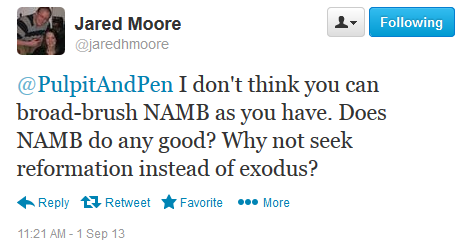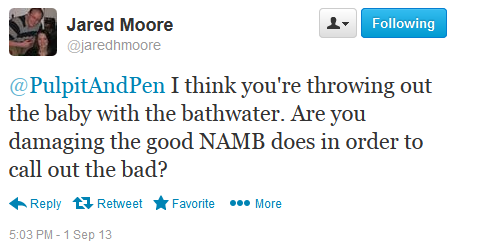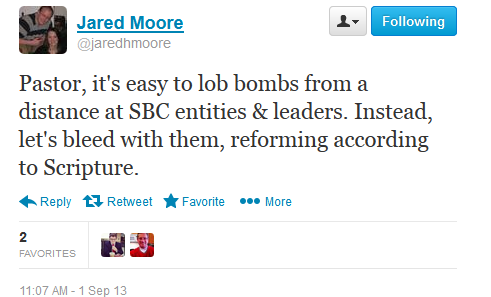Jared Moore (who I have no reason to believe is anything but a great guy), Second VP of the Southern Baptist Convention, posted an article today entitled, “Before Criticizing SBC Leaders and SBC Entities, Here are Some Good Questions to Ask.”
When one Southern Baptist pastor asked him via Twitter if it was in response to my article, Why I Don’t Support the Cooperative Program, Moore responded, “nope.” I’ll take him at his word. In fact, it may be a response to another Southern Baptist who I know has recently had a lengthy conversation with him on the topic, or could be a response to something else entirely (but it is mostly certainly a response of some kind – it didn’t come out of thin air). Concerning that article, Moore tweeted to me that I had “broad-brushed” NAMB.
The implication is that the content of my article – which specified why, as a steward of the Lord’s resources as given through my local church, I cannot endorse giving money through the Cooperative Program – made it seem that I was saying all of NAMB was bad, including every employee and program. While my article indeed mentioned the shortcomings of the North American Mission Board as a reason we could not give, was not meant to imply that NAMB is entirely bad. Of course, the fact that NAMB may do some good things doesn’t undo the fact that they have been irresponsible with God’s money, have covered-up financial fraud, and endorsed policies that are less than doctrinally sound. At no point have I said that NAMB is all bad, but that’s hardly a line of reasoning to convince a congregation to send it money. And before I’m accused of not being missions-minded or not believing in the cooperative spirit of Southern Baptists, my rural Montana church is financially partnering with a NAMB-supported church plant in one of the 32 major U.S. cities focused on in the Send North America initiative. Nonetheless, Moore continued this line of thought.
I’m “throwing the baby out with the bathwater”? What I’m doing is saving the baby by not giving it to an irresponsible babysitter. This mimics the reasoning and accusation pointed at whistle-blowers who publicize the wrong doing of various organizations; by pointing out the failures and cover-ups of the organization, it is the that person (and not the failures and cover-ups) that are responsible for damaging the organization. Moore began that day with a tweet obviously directed toward me, considering his next tweet was directly to me (the first one given above).
“Throwing bombs.” That’s what ‘sharing concerns’ amounts to, I suppose. One moment we’re a faithful, concerned Southern Baptist that’s distraught over what’s happening to our Convention and the next moment we’re spiritual terrorists. I’m also a bit befuddled at the accusation that it is “from a distance.” It’s true that NAMB’s headquarters may be in Georgia, but I’ve seen more first-hand experience of NAMB’s unfortunate influence in Montana to last me a life time. It didn’t feel “from a distance” in my meetings with NAMB employees and regional vice-presidents and personal communication with NAMB’s president (which after one response, went unanswered). I suppose I need to be in Georgia to opine on the institution.
The Native American pastor who testified of convention officials persuading him to send his members to a nearby NAMB-developed church plant, who then left the Native Americans without a church so they could become an affinity-based “cowboy church” wasn’t “from a distance.” I was close enough to see the tears in his eyes. The miles don’t matter. Believe me – it would be great for us in the frontier states if NAMB’s reach extended no further than the Bible Belt.
Insinuating that some have not put great care into what they have written (which may very well be true, but given Moore’s post is directed generally at unnamed offenders it’s impossible to know), Moore informs us that we – as Christians – are to be held to a higher standard. I whole-heartily agree. Moore continues to say that SBC leaders should want warranted criticism, but not unwarranted criticism. Once again, I whole-heartily agree. It would be unfair to criticize Southern Baptist leaders because of their skin color, minor personality differences, their eschatology, body mass index, or unsubstantiated rumors. Once again, with Moore’s generalities, it’s a mystery as to who he is referring to. I suspect that what Moore calls ‘unwarranted’ may very well be the concerns of Southern Baptist pastors in local churches from what they have observed with their own eyes, ears, and interactions with said entities. Perhaps not, to give Brother Moore the benefit of the doubt.
Just as Brother Moore’s post included eight questions for Southern Baptists to think about before they criticize SBC leaders or entities, I’d like to submit eight questions for Southern Baptist leaders to think about before they criticize Southern Baptists who have concerns with their leadership.
1. Am I hiding behind some good that an entity or person does to defend against the bad that they do? Is the fact that the entity isn’t all bad compelling me to overlook issues that must be fixed or sin that has to be addressed?
2. Am I confusing a pastor’s personal encounters with an entity and their own first-hand experience with “rumor” because it’s yet to be written about in the Baptist Press? To make this mistake is to be dismissive of the experience of individual Southern Baptists (at best) or to accuse them of lying (at worst).
3. Is my first impulse, when faced with an accusation, to speculate that those making the accusation aren’t loving enough or to insinuate that their heart isn’t right? Am I overlooking objective facts in order to make a subjective analysis of the condition of someone’s heart?
4. Am I under the notion that if indeed a person DOES have wrong motivations, that the facts they present are therefore invalid and need not be addressed?
5. As a leader responsible to tackling tough issues, am I using Matthew 18 out of context by insisting that those concerned with public officials, public policies and public entities repent of public sins and therefore passing the buck to the concerned person and telling them to “just deal with it” on their own?
6. Am I under the impression that Southern Baptists should just trust us when we say “we’re working on these issues” when we won’t publicly acknowledge those issues exist?
5. Do I truly believe that SBC leaders and SBC entities work for local churches? If so, when local churches complain, why is my first impulse to lecture them on love or defend the institution? Who do I really think I work for?
6. Am I under some kind of impression that addressing problems and publicly acknowledging our issue will make our Convention worse? If we preach repentance, are our leaders able to demonstrate it by repenting of our mistakes, sins and shortcomings? Won’t the Gospel win if we model confession and repentance?
7. Am I assuming that someone’s concern should automatically be interpreted as hatefulness until they prove themselves innocent? Am I judging their heart in error because they’ve judged a Southern Baptist leader or entity as in error?
8. Am I influenced in my desire to make peace over making necessary changes by aspirations to become a more prominent name or influence in the Southern Baptist Convention? In other words, am I handling this situation politically instead of with integrity? (And let me say explicitly, I have no reason to believe Brother Moore is guilty of this and so this is not a covert potshot at his character)
With much respect, Southern Baptists who are hurt and aching, broken and wounded by their interactions with entities (and less often, leaders) don’t need a lecture on how to complain with a more loving attitude. My friend who saw his spiritually-fragile Native American converts be left in the dust for NAMB’s church plant to run off and become cowboys doesn’t need to ask himself eight questions. He needs at least eight answers from Southern Baptist leaders as to why NAMB’s strategies disregard the local, existing church. The dozens upon dozens (and hundreds over the past year) of emails I’ve received from church planters and pastors who are at their wits end with this institution really don’t need a lecture; give grace to humble and law to the proud.
While it’s true that there are some who just want to watch the world burn, for every person who speaks up there are countless others who don’t for fear of being branded a trouble-maker or hater or in need of having their heart checked. We need accountability – that’s what we need.













